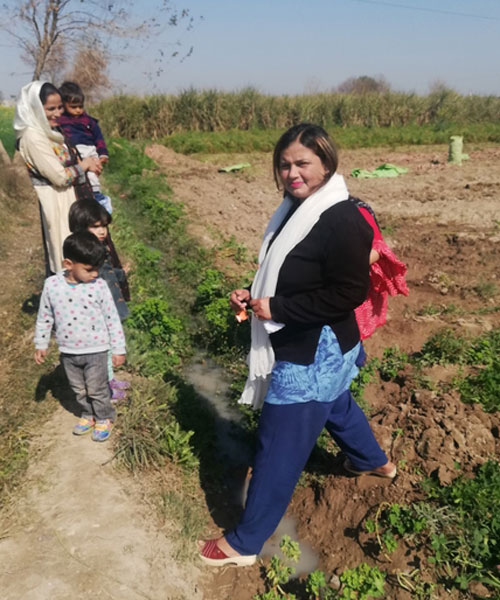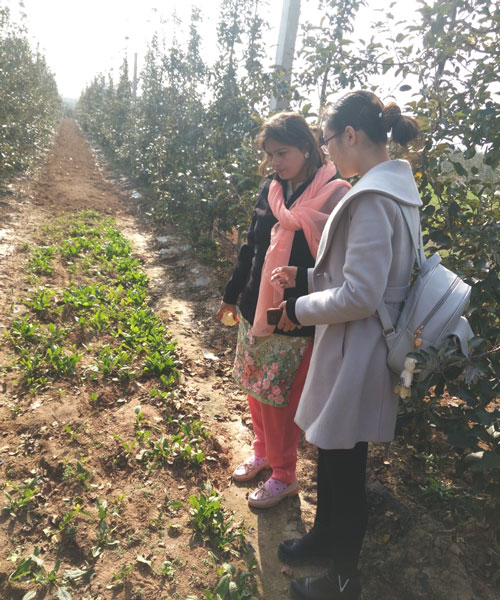The quality of soil and water poses fundamental constraints on agricultural production. But a range of other factors, from geographical features to climate instability, also affect crop yields and, in turn, the local economy. This is particularly important in countries like Pakistan, where agriculture accounts for 26% of the gross domestic product.
Nudrat Aisha Akram, currently an assistant professor of botany at the Government College University Faisalabad, Pakistan, is actively involved in improving Pakistani agriculture, devising new strategies to make crops more resistant to environmental stressors.
"I'm from a small village and I grew up seeing the efforts of small farmers and sharing their problems," Akram said. "This has oriented my scientific career and is inspiring my current research."
She started her work in 2006 as a research assistant in botany at the University of Agriculture in Faisalabad, carrying out extensive study to examine the effects of different environmental stressors on cereal crops such as wheat, rice and maize; on vegetables such as carrots, cauliflower, peas and turnips; and on oil-seed crops such as canola, sunflower and safflower.
She was selected as a TWAS Young Affiliate in 2015, and since 2016 she has belonged to the TWAS Young Affiliates Network, TYAN. This dynamic network of young TWAS researchers was created in 2016 with support from Lenovo, the global tech and computing leader based in China.
With more than 250 affiliates, TYAN connects TWAS's younger scientists worldwide, enabling them to build partnerships, develop new ideas, share problems and devise innovative solutions on topics of local and regional interest. "Being a member of TYAN is a springboard for sharing my skills on farming studies," Akram said in a recent interview. "And it offers the opportunity to broaden my international collaborations."
Akram also is a member of OWSD, the Organization for Women in Science for the Developing World, which is based in Trieste, Italy, and is closely affiliated with TWAS. Her agricultural research and advocacy for women in research and technology make her an influential voice in Pakistan and beyond.
Understanding the impacts of drought
With time, she has specialized in plant stress physiology, studying in particular the effects of drought and soil salinity on crops and seeds that are important for local consumption. These are vitally important areas for the science of food production. Extreme shortage of water causes unwanted increase in soil salts. That affects plants' growth and, in turn, can trigger food insecurity in a population of more than 200 million.
The Pakistani economy revolves around agriculture, but climate change and the geography of the country itself take a heavy toll on agricultural practices. Agriculture in Pakistan is dominated by small farmers who have limited economic and technological resources, and often limited knowledge.
"That's why we have worked much to establish good collaborations with farmers," pointed out Akram. "We want to offer concrete help by selecting vegetable lines that are more resistant to stress. Then we explain our goals and encourage farmers to use these new crops."
Nutritional imbalance as a result of a poor diet is a critical issue for millions of people in Pakistan and other countries in the region. To contain this problem, Akram and her group are supplementing selected crops with vitamin C, salicylic acid, proline, calcium and phosphorous through foliar feeding.
This technique is producing promising results. "Foliar feeding is a technique that allows us to feed plants by applying liquid fertilizers or other substances directly to their leaves, because plants are able to absorb essential elements through this route," she explained.
Another technique they are exploring is "seed priming", which allows better control of the germination process by managing the temperature and seed moisture content. In addition, seeds can be soaked in nutrients for several hours in order to strengthen their ability to react to environmental stressors. "We apply essential chemicals to seeds for few to several hours, and this allows them to germinate even if outer conditions are not ideal," she said.
Important international partnerships
Another important avenue Nudrat Akram is exploring involves collaboration with China. "In the Lanzhou area, within the Gansu Province in South China, there is a dramatic shortage of water," she noted. "With my team, we are introducing organic fertilizers and selecting cereal crops/vegetable varieties that might respond better to local conditions."
Within this project, building a close bond with Chinese farmers is an essential part of Akram's work, as she needs to apply her knowledge and technology after adjusting it to local needs and traditions.
Akram's 2015 membership as a TWAS Young Affiliate has offered her interesting opportunities to grow professionally and culturally: she first visited Austria during the 26th TWAS General Meeting in Vienna in 2015, and then went to Japan.
"On another occasions, TWAS has provided me with travel support to attend international conferences: I have received two travel grants in the last two years to participate in a TYAN conference held in Brazil, in October 2017 and in another one in Egypt in March, 2019, where TYAN has offered support for my travel."
"During all these travels I met with many young scientists in my field," she said, "and we are now establishing productive partnerships." With a strong professional curriculum including more than 125 scientific publications, 15 review articles and 3 chapters in a book, Akram and her research are becoming a vital point of reference for Pakistan.
Cristina Serra

